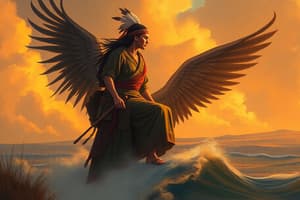Podcast
Questions and Answers
What is Mercantilism?
What is Mercantilism?
Mercantilism is an economic theory that promotes governmental regulation of a nation's economy to augment state power.
Who was the Aztec king?
Who was the Aztec king?
The Aztec king was Moctezuma II.
What does 'Pueblo' mean?
What does 'Pueblo' mean?
'Pueblo' means 'village' in Spanish.
What is a conquistador?
What is a conquistador?
What is an astrolabe?
What is an astrolabe?
Flashcards are hidden until you start studying
Study Notes
Key Economic and Exploration Concepts
- Mercantilism: An economic theory emphasizing the accumulation of wealth through trade, where colonies exist to benefit the mother country by providing resources and markets.
- Circumnavigate: To travel around something, specifically referring to Magellan's expedition that successfully sailed around the globe.
Notable Historical Figures and Events
- Christopher Columbus: Italian explorer credited with discovering the Americas in 1492, initiated extensive European exploration and colonization.
- Spanish Armada: A fleet of 130 ships sent by Spain in 1588 aiming to invade England, defeated by weather and naval tactics, leading to a shift in naval dominance.
- Henry Hudson: An English explorer known for his explorations of Canada and northeastern United States; he sought a northwest passage for trade.
Navigation Tools and Techniques
- Compass: An instrument that shows direction relative to the Earth’s magnetic poles, essential for navigation at sea.
- Astrolabe: A historical navigational tool used to measure the altitude of stars and planets, helping sailors determine latitude.
- Caravel: A small, fast sailing ship developed in the 15th century, designed for exploration and trade, with lateen sails allowing for better maneuverability.
Indigenous and Colonial Terms
- Pueblo: Spanish term for "village" used to describe the communities of Native Americans in the Southwest United States.
- Conquistador: Spanish term meaning "conqueror," referring to explorers and soldiers who invaded and colonized Latin America.
Significant Peoples and Places
- Aztec King: Moctezuma II was the ruler of the Aztec Empire when it encountered Spanish explorers, notably Hernán Cortés.
- Oldest Permanent City: St. Augustine, Florida, established in 1565 by Spanish settlers, is the oldest continuously inhabited European-established city in the continental United States.
- Lost Colony of Roanoke: The word "CROATOAN" was carved into a tree, indicating a potential destination or fate of the settlers who vanished.
Geography and Historical Context
- Bering Strait: A narrow sea passage that separates Russia from Alaska, believed to have been a land bridge for early humans migrating to the Americas.
- Spanish Armada Composition: Comprised approximately 130 ships and around 30,000 men, attempting to restore Catholic rule in England.
Studying That Suits You
Use AI to generate personalized quizzes and flashcards to suit your learning preferences.




